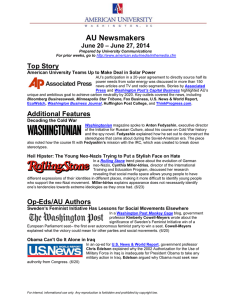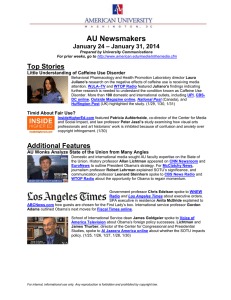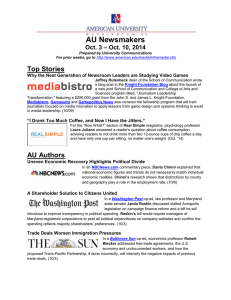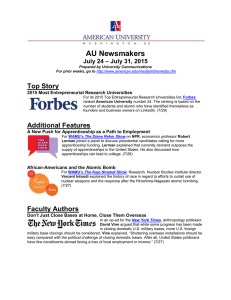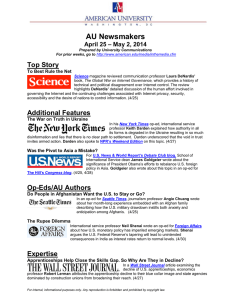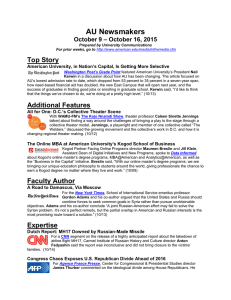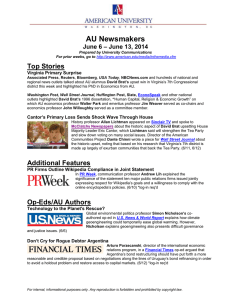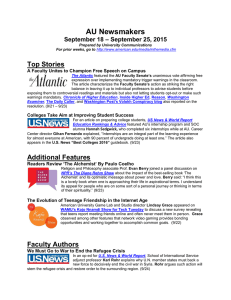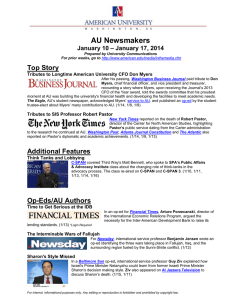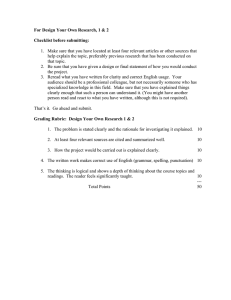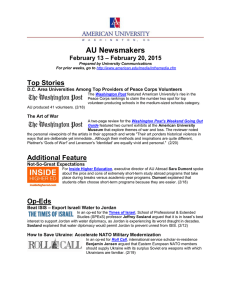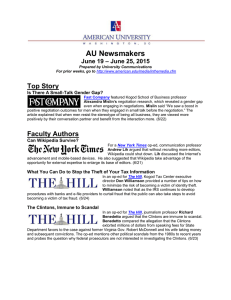AU Newsmakers Top Stories – October 2, 2015 September 25
advertisement
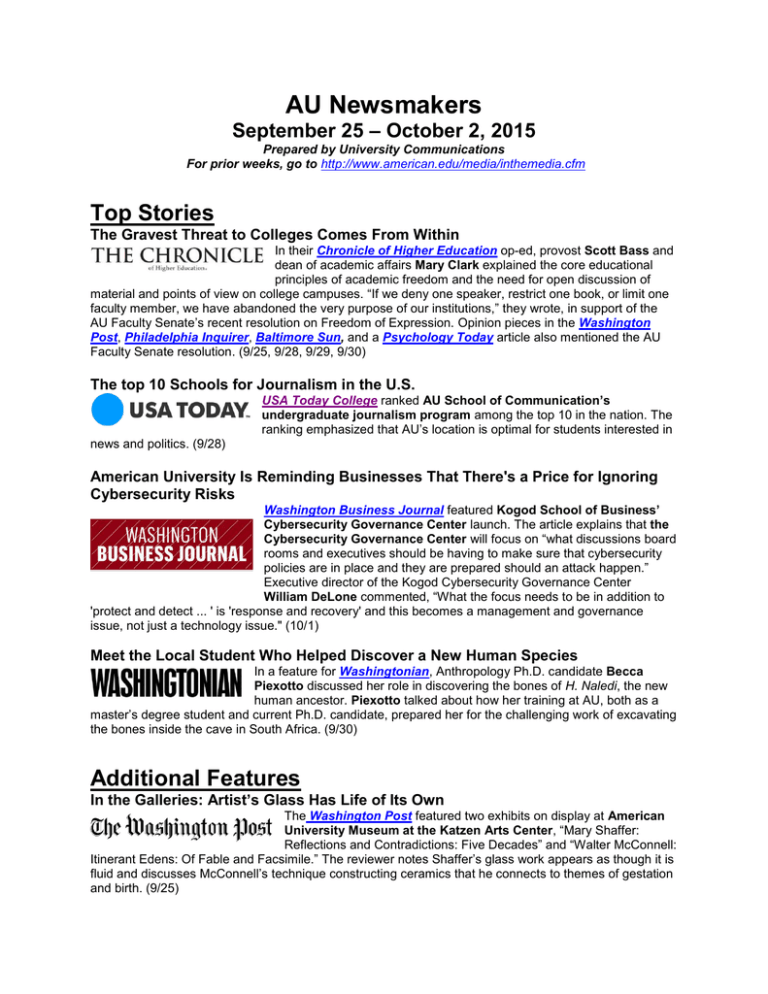
AU Newsmakers September 25 – October 2, 2015 Prepared by University Communications For prior weeks, go to http://www.american.edu/media/inthemedia.cfm Top Stories The Gravest Threat to Colleges Comes From Within In their Chronicle of Higher Education op-ed, provost Scott Bass and dean of academic affairs Mary Clark explained the core educational principles of academic freedom and the need for open discussion of material and points of view on college campuses. “If we deny one speaker, restrict one book, or limit one faculty member, we have abandoned the very purpose of our institutions,” they wrote, in support of the AU Faculty Senate’s recent resolution on Freedom of Expression. Opinion pieces in the Washington Post, Philadelphia Inquirer, Baltimore Sun, and a Psychology Today article also mentioned the AU Faculty Senate resolution. (9/25, 9/28, 9/29, 9/30) The top 10 Schools for Journalism in the U.S. USA Today College ranked AU School of Communication’s undergraduate journalism program among the top 10 in the nation. The ranking emphasized that AU’s location is optimal for students interested in news and politics. (9/28) American University Is Reminding Businesses That There's a Price for Ignoring Cybersecurity Risks Washington Business Journal featured Kogod School of Business’ Cybersecurity Governance Center launch. The article explains that the Cybersecurity Governance Center will focus on “what discussions board rooms and executives should be having to make sure that cybersecurity policies are in place and they are prepared should an attack happen.” Executive director of the Kogod Cybersecurity Governance Center William DeLone commented, “What the focus needs to be in addition to 'protect and detect ... ' is 'response and recovery' and this becomes a management and governance issue, not just a technology issue." (10/1) Meet the Local Student Who Helped Discover a New Human Species In a feature for Washingtonian, Anthropology Ph.D. candidate Becca Piexotto discussed her role in discovering the bones of H. Naledi, the new human ancestor. Piexotto talked about how her training at AU, both as a master’s degree student and current Ph.D. candidate, prepared her for the challenging work of excavating the bones inside the cave in South Africa. (9/30) Additional Features In the Galleries: Artist’s Glass Has Life of Its Own The Washington Post featured two exhibits on display at American University Museum at the Katzen Arts Center, “Mary Shaffer: Reflections and Contradictions: Five Decades” and “Walter McConnell: Itinerant Edens: Of Fable and Facsimile.” The reviewer notes Shaffer’s glass work appears as though it is fluid and discusses McConnell’s technique constructing ceramics that he connects to themes of gestation and birth. (9/25) Almost 200 Top Tier Colleges Don’t Require SAT Scores — Yes, Really Vice Provost for Undergraduate Enrollment Sharon Alston spoke to MTV about why AU is test optional for its admissions process. Alston explained, “There are many ways to assess talent and fit with an institution. Providing students with the option to have their testing considered (or not) in the admission process, removes an element of stress and allows students to present themselves in their best light.” (9/30) Extra School Days Help High-Flyers More Than Struggling Students Education Week featured assistant professor in the Department of Public Administration & Policy Seth Gershenson’s latest research examining why Kindergartners who are already academically strong at the beginning of a school year appear to learn even more during each day spent in school. Gershenson cautions, “"The effect is always positive, it's just that it's bigger for some kids than others. The reason that might be concerning is that it's not the case that the biggest effects are for low-achieving kids." (10/1) Faculty Authors A Healthy Environment is a Human Right School of International Service professor Ken Conca in his Guardian (U.S. edition) op-ed argued that the newly adopted United Nations Sustainable Development Goals should be rightsbased under the UN Charter. Conca wrote, ”if we had framed the goals themselves as human rights, we would have made achieving them much easier – and sent a powerful message to governments across the world that they must protect, respect and fulfill their citizens’ access to a safe and healthy environment.” (10/1) Congress Must Support Iran Deal Implementation For The Hill’s Congress Blog, International Peace and Conflict Resolution program director Anthony Wanis-St. John and his coauthor argued that the Iran nuclear deal must be implemented because “Gutting this agreement would leave only weak political constraints on Iran’s nuclear program and break the unified front it has built with its close allies.” (9/28) As Relationship Builder, China Has Diplomatic Edge Communication professor Rhonda Zaharna in her op-ed appearing in ChinaDaily explained China’s successes and areas in need of attention when employing public diplomacy as a foreign policy tool. Zaharna wrote, “Strategic communication is not a cure-all or replacement for relational approaches, but it is an asset that, well developed and timed, can help smooth rough waters and make navigating in ChinaU.S. relations perhaps a little easier.” (9/26) Expertise At U.N., Obama Touts Diplomacy Over Military Force as Conflicts Mount For the Washington Post, School of International Service assistant professor David Bosco spoke about the deterioration of relations on the United Nations Security Council under President Obama’s watch. Bosco said, “Because of the difficulty in the relationship with Russia, the Security Council has become more difficult terrain for the United States than when Obama took office.” For another Washington Post article Bosco explained that the United States views some UN Security Council reforms as not being in its national interests. (10/2) U.S. and Russian Presidents Talk Syria and Ukraine Carmel Institute of Russian History and Culture director Anton Fedyashin spoke with CNN International about talks opening between Presidents Vladimir Putin and Barack Obama, saying, “Speaking to each other and posing for the cameras becomes important because it begins to break the ice and now the dirty work of diplomacy begins.” Fedyashin also spoke with CCTV America for their coverage of the U.N. General Assembly meeting. (9/29) School of International Service professor Gordon Adams spoke to U.S. News & World Report about the need for U.S. policy on Syria to change because “We don't have any internal leverage in Syria.” (9/29) Taliban Topples Kunduz: What That Means for Afghanistan's Security For the Christian Science Monitor, School of International Service practitioner in residence Lt. General David Barno (Ret.) explained the concerns over the Afghan National Security Forces readiness and symbolism of an Afghan provincial capital falling into Taliban hands. (9/29) New Speaker, Same Problems: McCarthy Will Likely Face Same Challenges as Boehner Congressional and Presidential Studies director James Thurber spoke to U.S. News & World Report about the challenges Kevin McCarthy will face should he be elected the next the Speaker of the House. Thurber explained that healing the divisions among House Republicans may present McCarthy with the same issues Boehner faced. (9/28) Hillary Clinton's Challenge: Sexism or 'Clinton-ism'? Women and Politics director, Jennifer Lawless spoke to the Christian Science Monitor about whether Hillary Clinton’s poll numbers reflect “Clintonism” rather than “sexism” as Bernie Sanders closes in on Clinton’s lead. (9/30)
